Bob Ellis’ Rough Cut: Tomorrow, When the War Began
Bob Ellis on Tomorrow, When the War Began, Me and Orson Welles, The Ghost Writer, The Special Relationship, The Kids are Allright, South Solitary and The Disappearance of Alice Creed.
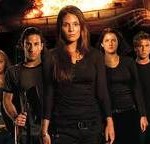 A good title; young people; great scenery; war and rescue; love in the forest; tank battles, helicopter-gunship strikes and coming of age; will this mix of things succeed commercially? How could it not?
A good title; young people; great scenery; war and rescue; love in the forest; tank battles, helicopter-gunship strikes and coming of age; will this mix of things succeed commercially? How could it not?
Tomorrow When The War Began has elements of Stand By Me, Spartacus, Bridge On The River Kwai, Gone With The Wind and Schindler’s List plus Wolf Creek’s beginning, a holiday gone heinously wrong, and it shows like Mad Max and Romper Stomper that fiction is worth trying in Australia. For too long we have worthily shown that adolescent memoir, ancient murder headlines, vampires, outback pioneering, urban misery, feral pigs and race relations do not draw audiences into multiplexes though working class comedies do. To this we can anyway now, at last, add teenage adventure, Enid-Blyton-with-deadly-weapons, and dishy adolescents repelling heathen invaders by seat-of-the-pants ingenuity, car theft, mechanical nous and the incendiary power of petrol.
I shouldn’t say much more than this. The spunky young actors are all pretty much astonishing: Greek-Australian, Chinese-Australian, black Irish, green-eyed redhead, snobby blonde, male bimbo, pothead and freckled pious pubescent, they would all of them scrub up well in a local Sex and the City. The explosions are very classy; the interior farmhouse designs world standard; Dungog has never looked more blitzed. A sequel seems likely, the writer-director Stuart Beattie an emerging young genius. Rejoice, I say unto you rejoice, and lemonade all round.
EPHRON DOES WELLES
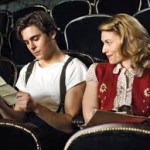 I’ve seen Me and Orson Welles eight times now, taking elderly friends amazed to be undergoing again so clearly a past they were formed by. If State and Main is the best laugh-laced account of location shooting, Orson is the best, most ebullient backstage romance ever made.
I’ve seen Me and Orson Welles eight times now, taking elderly friends amazed to be undergoing again so clearly a past they were formed by. If State and Main is the best laugh-laced account of location shooting, Orson is the best, most ebullient backstage romance ever made.
For it’s much more than a backstage romance. It shows with love the thunderous charlatan Welles, enslaver and screwer-over of the sensitive young, chewing up time and scenery with ego, adultery, serial deception, petty revenges and prestigitation; if ever there was a show-off as vast as Baron Munchausen it was this foolish, ungenerous fast-moving boy, twenty-two years old and already doomed to titanic voyage and certain shipwreck. Christian McKay gets perfectly his Mephistophelian, offhand style, channelling somehow his throwaway basso Brutus in the strutting-fascist Julius Caesar that transformed, we are told, American theatre.
But Claire Danes as the shrewd backstage temptress Sonja Jones, an intricate star-schtupping girl-next-door you somehow admire for her ambitious infidelities is in many ways just as good. And James Tupper as Joseph Cotten is a ringer, Eddie Marsan as longsuffering John Houseman very moving, Ben Chaplin as the haughty, third-rate thespian George Coulouris is terrific and a swag of chirpy, doleful and grumbly walk-ons all you would wish.
Which leaves…Zak Ephron as the wily schoolboy actor Richard Samuels, louche beyond his years and abubble with wacky-comedy zingers and Fred Astaire moves that arouse Miss Jones and even charm the Grand Competitor Orson for a while. He seems a genuine star, somewhere between James Dean and Jack Nicholson, already outclassing Leonardo di Caprio, a kid who will stay in pictures. The script by Holly Gent Palmo is Casablanca-classy and the extraordinarily various director Richard Linklater (Before Sunset, Before Sunrise) old-fashioned, in this case, in a sexy-cool Ernst Lubitsch or Billy Wilder way. The best 1930s romcom lately made, it should not only be seen but bought.
YEAR OF BLAIR
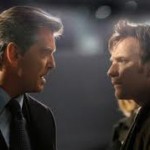 Of two Tony Blair films the fictional one by Thomas Harris and Roman Polanski is unsurprisingly the better. The Ghost Writer, set on a bleak grey rocky island off (it seems) Massachusetts in a ‘secure’ white fortress bristling with computers, and shot in a slow and spacious Alfred Hitchcock style that keeps us credulous and scared, it follows a hack writer (Ewan McGregor), a bit like Bill Holden in Sunset Boulevard, as he tries to decipher the garbled memoir of the recent, contentious, persuasive ex-Prime Minister of Great Britain Adam Lang (Pierce Brosnan), and to discover why his predecessor, another hack writer, drowned off Martha’s Vineyard in apparent suicidal despair.
Of two Tony Blair films the fictional one by Thomas Harris and Roman Polanski is unsurprisingly the better. The Ghost Writer, set on a bleak grey rocky island off (it seems) Massachusetts in a ‘secure’ white fortress bristling with computers, and shot in a slow and spacious Alfred Hitchcock style that keeps us credulous and scared, it follows a hack writer (Ewan McGregor), a bit like Bill Holden in Sunset Boulevard, as he tries to decipher the garbled memoir of the recent, contentious, persuasive ex-Prime Minister of Great Britain Adam Lang (Pierce Brosnan), and to discover why his predecessor, another hack writer, drowned off Martha’s Vineyard in apparent suicidal despair.
Many classic Polanski feelings and flavours are here: claustrophobia (as in The Tenant); a manipulative couple (Knife in the Water); political corruption (Chinatown); a baffled questing artist-narrator (The Pianist) and a feeling that all the dice are loaded against goodness in the world. Several of Lang’s political adversaries live on the island too (one suspects that Harris’s story was originally set on a Channel tax-haven like Jersey or Sark or Alderney) and lead the questing hack to believe Lang a war criminal complicit in ‘rendering’ prisoners subsequently waterboarded, and bound soon for trial in The Hague. And then…But I shouldn’t spoil it for you. Tom Wilkinson plays Paul Emmett, the scholarly CIA connection with sinister mildness, superbly, and Robert Pugh, the Robin Cook figure Richard Rycart, and a very Polanski beach eccentric witness of the first ghost writer’s washed-up corpse. McGregor as the questing hack (guided sometimes by the navigating voice in his dead predecessor’s car) is suitably hollowed-out, boozy, worthless and free of hinterland like a Graham Greene anti-hero; Piers Brosnan as Lang charismatic, edgy, menacing, petulant and casually murderous like the original. But, as everyone has said, the acting honours go to Olivia Williams as Ruth, Lang’s wife, adviser and (probably) recruiter who takes McGregor into her bed without making him suspect her, and beguiles us, like him, with her frankness, brilliance and wifely need.
Polanski (of course) was exiled and threatened in Switzerland too, as he completed this lesser late masterpiece uncomplaining. I know he gave a little girl a sore arse once but Dickens did worse, and Byron, and Shakespeare, and Socrates and (or so I hear tell) the Holy Ghost to a thirteen-year-old girl in Nazareth in 1 B.C. Roman’s wife and unborn son were butchered, his mother died in Auschwitz, his wartime Krakow boyhood was a living hell and he is, in short, a man more sinned against than sinning and for all his pubescent dalliances a great artist nonetheless.
Or perhaps you disagree.
 The Blair-Clinton film The Special Relationship, by the usual suspects from The Queen, Front/Nixon and director Richard Loncraine walks Michael Sheen for the third time through his famed big-smiling role. And it’s fine, but it works less well than the others in part because of Dennis Quaid’s lack of close resemblance to Clinton (most JFKs have this problem too) though the voice and the inner trailer-trash-kid surliness are excellent. But it gets exactly right Blair’s ideological frivolousness – a concerned social democrat one day, a war-thirsty Tory the next – and Clinton’s embittered working-class resentment of his dissembling. ‘You’re not one of us now, are you?’ he says. ‘And I don’t think you ever were.’
The Blair-Clinton film The Special Relationship, by the usual suspects from The Queen, Front/Nixon and director Richard Loncraine walks Michael Sheen for the third time through his famed big-smiling role. And it’s fine, but it works less well than the others in part because of Dennis Quaid’s lack of close resemblance to Clinton (most JFKs have this problem too) though the voice and the inner trailer-trash-kid surliness are excellent. But it gets exactly right Blair’s ideological frivolousness – a concerned social democrat one day, a war-thirsty Tory the next – and Clinton’s embittered working-class resentment of his dissembling. ‘You’re not one of us now, are you?’ he says. ‘And I don’t think you ever were.’
ALL RIGHT INDEED
 I didn’t think The Kids Are All Right would be bad, but I was very surprised by how good it was. With what may be the first new storyline since Aristophanes’ The Women – the sperm donor is back, and both the kids and one of the moms really like him – it not only speeds gay marriage worldwide (I predict a five percent shift of opinion as a result of it) but also makes human poignant and tragi-comic an arrangement – two lesbians, two pregnancies, educated suburban priorities and money pressures – which many till now might have thought bizarre.
I didn’t think The Kids Are All Right would be bad, but I was very surprised by how good it was. With what may be the first new storyline since Aristophanes’ The Women – the sperm donor is back, and both the kids and one of the moms really like him – it not only speeds gay marriage worldwide (I predict a five percent shift of opinion as a result of it) but also makes human poignant and tragi-comic an arrangement – two lesbians, two pregnancies, educated suburban priorities and money pressures – which many till now might have thought bizarre.
Annette Bening and Julianne Moore as Nic and Jules, creased and comfortable and lived-in as two old sandshoes (the one going down while the other watches big-schlonged gay male porn and the kids do their homework) as disrupted in their daughter Joni’s (Mia Wasikowska) last year of high school by their sperm donor Paul (Mark Ruffalo) whom the son Laser (Josh Hutcherson), who may be gay himself, has asked her to make contact with. He’s a local restaurateur with jovial, dumb-ass peasant qualities (and two hot babes who service him) and he begins to come round charming the kids with his normalcy and playing backyard games. Soon the redhead mom, a thwarted landscape artist, is secretly whanging him and massive brouhaha then ensues and this two-child family is soon, as we say, at risk.
Related like this it sounds coarse and ho-ho but it’s not. It’s very character-driven with Bening a terse, tippling, control-freakish medico and Moore unsettled, artistic horny and (big plot point) redheaded, the daughter judgemental and scholarly, the son amused, big-shouldered and athletic, and the arrival of what amounts to Mellors in their ordered lives is as disruptive and, for a good while, pleasingly comic as unjudgemental audience might, over popcorn, hope for.
But the shakedown is not so pleasant, and the mere-bagatelle plotline is lifted up to Ibsen, correctly, for a while. These are people a dramatist should not trifle with, and it is good we get to know them as well as we do. Four stars, and climbing.
WITH A GRAIN OF SALT
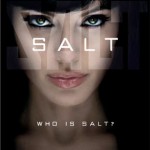 Of Noyce’s fast-paced spy thriller Salt, very impressive for most of its length, it’s hard to say what, finally, is wrong but something is. Angelina Jolie, in Run, Lola, Run mode, is impelled, heroic, full of back-story and plausibly Russian; Liev Schreiber, a great actor, massively deadpan and torn (for he loves her) as her CIA pursuer. Various well-cast actors litter the corpse-count and the unremitting car chases and the always surprising neo-Cold War switcheroos. And the final shot, with Angelina puffing through bushland, fit as a trout, prepares us well for the sequel.
Of Noyce’s fast-paced spy thriller Salt, very impressive for most of its length, it’s hard to say what, finally, is wrong but something is. Angelina Jolie, in Run, Lola, Run mode, is impelled, heroic, full of back-story and plausibly Russian; Liev Schreiber, a great actor, massively deadpan and torn (for he loves her) as her CIA pursuer. Various well-cast actors litter the corpse-count and the unremitting car chases and the always surprising neo-Cold War switcheroos. And the final shot, with Angelina puffing through bushland, fit as a trout, prepares us well for the sequel.
But something is wrong. We will buy the orphaned-Russian-children-trained-from-infancy-for-their-several-suicide-missions premise. We can cop the various character transformations, we can abide, at a stretch, a KGB still keen to nuke America. But something is wrong. It may be Salt’s continuing willingness to murder, on whatever provocation, what are, in effect, her father and male siblings. Sure, they killed her husband before her eyes, but, hey. Like most Noyce films it purges and thrills but afterwards feels like…a souped-up FJ Holden roaring in circles round the Kremlin to no good end.
FEMINIST FABLE
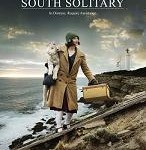 In South Solitary we see that rarity, a timeless, borderless, feminist fable set within Australia yet international in impact as Chekhov or John Fowles or a film by David Lean.
In South Solitary we see that rarity, a timeless, borderless, feminist fable set within Australia yet international in impact as Chekhov or John Fowles or a film by David Lean.
Lean comes to mind, Ryan’s Daughter perhaps, in many of its sea-splashed rocky-lighthouse compositions, the strong female faces, the lonely tanned men and their dreamings.
Miranda Otto plays that equivocal role, a spinster, who in 1928 accompanies her fussy, punishing uncle (Barry Otto), a lighthouse inspector, a pet lamb and some carrier pigeons to a rocky island remoteness and does not fit in. The under lighthouse keeper’s splenetic wife Alma (Essie Davis) resents and insults her. Her morose little daughter Nettie (Annie Martin) thinks her a fool. Her lamb disappears. The under lighthouse keeper Harry (Rohan Nichol) comes sniffing after her, wanting sex. She reluctantly, then avidly, gives it to him. Other things happen, and she ends alone with Fleet (Marton Csokas), a war-traumatised phlegmatic Welshman, in a relationship like Hepburn and Bogart in The African Queen. At one point, in a high wind, he guides her to an outdoor toilet, its walls blown away, and averts his eyes while she uses it.
It would be wrong to reveal too much of the plot. But Shirley Barrett has contrived a unique film, with no flaws, of extraordinary impact and beauty that, had it been made in 1948 or 1965, would have been a world classic now. Essie Davis lights up the screen with fury as always, Barry Otto is disturbingly sado-masochistic with his birth daughter, Marton Csokas impenetrably troubled and silent as, say, Marlon Brando in The Fugitive Kind, and Miranda Otto as Meredith Appleton…
Miranda gives us twentieth century womankind in a single performance. Bereft of her betrothed man who was killed in World War I, aborted after an affair with a married man, sterilised after the abortion’s botching, barren but sexually hungry, socially disgraced and shamed by the only relative, her uncle, she has left in the world, she gives us, with dignity and buoyant mid-aged beauty, what Shakespeare called the age and body of the time, its form and pressure, and a great measure of what women in our grandmothers’ time went through.
A great film, in a great Australian year, which would, in a just world, do very well overseas. But who knows any more.
AROUSING AND INSTRUCTING
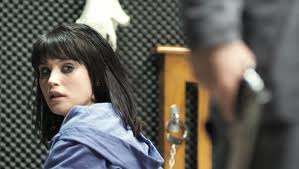 From another eloquent remoteness, the Isle of Man, comes a masterful thriller, The Disappearance of Alice Creed. Much of it silent, or with smatters of dialogue that might have been improvised, it recounts at horrific speed and with aching suspense a kidnapping and what follows. Two prison cell-mates (Vic and Danny) are the perpetrators, a wayward rich girl known to Danny, the resourceful victim, Alice Creed.
From another eloquent remoteness, the Isle of Man, comes a masterful thriller, The Disappearance of Alice Creed. Much of it silent, or with smatters of dialogue that might have been improvised, it recounts at horrific speed and with aching suspense a kidnapping and what follows. Two prison cell-mates (Vic and Danny) are the perpetrators, a wayward rich girl known to Danny, the resourceful victim, Alice Creed.
Much of the film occurs in a couple of rooms. The tied-down girl, who taped mouth, her urinary difficulties, her pleas and stratagems, will appeal to some S&M fanciers but excruciate most of the rest of us. The plot twists are always unexpected. The fear is tremendous.
Eddie Marsan, dormouse-faced, unknowable, perverted and murderous, exudes impelling misogynistic menace in every frame. Few actors can do what he does, though Donald Pleasance comes to mind. Martin Compston as his handsome crony, bisexual and amiably treacherous, is equally good, and Gemma Arterton as Alice, sensual, spirited and fighting for her life, superb.
It is, I suppose, what you might call a minimalist thriller. Like Agatha Christie, it uses the very few physical things in the grimy flat – a locked lavatory, a spent cartridge, a bed, a pissing-pot – with scary ingenuity. Like Psycho it terrorises every minute of its length with things we know and the characters don’t. And we watch them finding out.
No more should be said than this. Like Rififi it is unique and contained. Like The Collector, perversely erotic. It purges with pity and terror. It arouses and instructs.
I’ve not experienced a better year in cinema. Yet fewer and fewer people are going to the movies. And it’s a pity.

